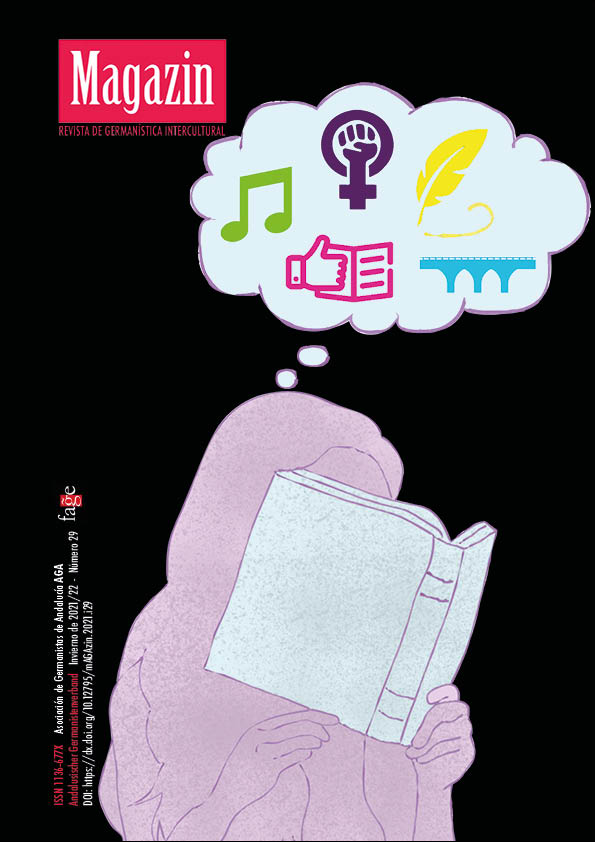The importance of adapting the translations and commentaries of Lieder to the target reader, as a didactic proposal to improve the training of students of singing
DOI:
https://doi.org/10.12795/mAGAzin.2021.i29.02Keywords:
German, music, song, literature, translation, interpretationAbstract
Translating the Lied is a very difficult task, and the importance of the text is often forgotten when it is interpreted vocally. It is essential for a correct vocal interpretation of a musical work that the performer knows in depth what he is singing, since the composer has chosen this text because it has influenced his life and has decided to make it musical. For this reason, it is so significant to translate, understand and analyse from different points of view the intention of both the author of the literary work and the composer. Music can transmit, transport words, and convert them into melody using the text, but if the text is not understood or adapted to the target audience (students of conservatories or music schools) it is not useful to understand the ultimate intention of the creators, which helps singing students to improve their performance.
Downloads
References
Balbuena, C. (2012). Entre la Filología y la Traducción: la labor del traductor literario. En M., Pfeiffer, T., Vinardell i Puig y A. Montané (coord.), Was mich wirklich interessiert. Homenatge a Jordi Jané. (pp. 37-46). Editorial Documenta Universitaria Girona.
Cardó, A. (2017). El Lied romántico alemán. Alianza música.
Carreras, J. J. (1998). La música y sus nombres. [Reseña del libro Diccionario Harvard de Música, de D. M. Randel]. Revista de libros segunda época, 13. https://www.revistadelibros.com/diccionario-harvard-demusica.
Der Erlkönig. (13 de octubre de 2021). En Wikipedia. https://es.wikipedia.org/w/index.php?title=Der_Erlk%C3%B6nig&oldid=139025592.
Einstein, A. (1986). La música en la época romántica. Alianza música.
Elena García, P. (2007). Reflexiones en torno a la enseñanza de la traducción especializada. Panace@, 26, 101-102. https://www.tremedica.org/wp-content/uploads/n26_editorial.pdf
Fischer-Dieskau, D. (1985). Hablan los sonidos, suenan las palabras. Ediciones Turner.
Goethe J. W. [OxfordLieder] (15/11/2013). Franz Schubert: Erlkönig [vídeo]. https://youtu.be/JS91p-vmSf0.
Gomar, A. B. (2005). Stimmung, Un ensayo sobre la mística musical. Espacio Sonoro, 7, 1-34. http://espaciosonoro.tallersonoro.com/wp-content/uploads/2019/08/Analisis-Stimmung.pdf.
Letras (s.f.). Erlkönig. https://www.letras.com/franz-schubert/erlkonig/traduccion.html
Maldonado, M. y Hernández, I. (2003). Literatura alemana. Épocas y movimientos desde los orígenes hasta nuestros días. Editorial Alianza.
Massin, B. (1997). Franz Schubert Bibliografía. Ediciones Turner.
Pacheco, J. y Vera, C. (1998). El romanticismo europeo. Universidad de Sevilla.
Reverter, A., Cardó, A., Schmidt, S., Gragera, E., Viribay, A., Carril, J. y Alonso, L. (2008). El nacimiento del Lied. https://www.march.es/es/madrid/nacimiento-lied.
Salvador, L. (2021). Manuel González Prada y la traducción como recreación: el caso de “Erlkönig” de Johann Wolfgang Goethe. Revista Cadernos de Tradução, 41(1), 148-170. https://doi.org/10.5007/2175-7968.2021.e77113
Sanz Julián, M. (2008). Propuestas didácticas para la enseñanza del Alemán aplicado al Canto. En Pichler, G., Haus B., Benito, M., García I. y Ortiz de Urbina P. (coord.), Germanística y enseñanza del alemán en España (pp. 215-224). Editorial Idiomas.
Sopeña Ibañez, F. (1973). El Lied romántico. Moneda y Crédito.
Valencia Restrepo, D. (2021). Poesía y música en las canciones de Schubert. https://www.valenciad.com/LiederSchubert/LiederSchubert.pdf
Walker, S. y Vignoles, R. (1989). Erlkönig [Canción]. The Great Schubert Singers. Brillant Classic.
Published
How to Cite
Issue
Section
License
Self-archiving policy
Romeo Blue Journal (applied)
Only editor PDF can be archived
Author cannot archive the pre-print version
Author cannot archive the postprint version




